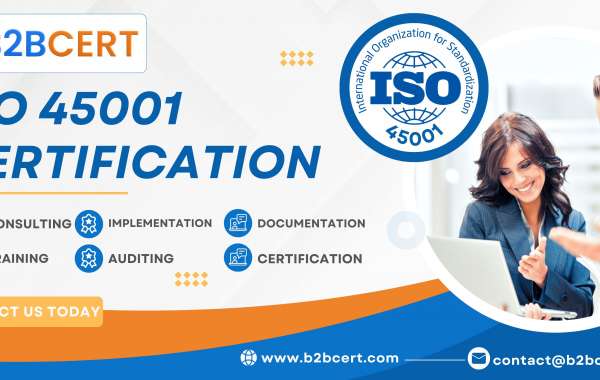ISO 45001 is an internationally recognized standard for Occupational Health and Safety (OH&S) management systems. Introduced by the International Organization for Standardization (ISO), this certification aims to prevent workplace-related injuries, illnesses, and fatalities, fostering a safer and healthier work environment. In Qatar, where rapid industrial growth and infrastructural development demand stringent health and safety standards, ISO 45001 Certification in Qatar has gained significant traction across sectors, including construction, oil and gas, manufacturing, and service industries. Here’s an in-depth look at what ISO 45001 entails, its benefits, and the process for obtaining this certification in Qatar.
What is ISO 45001?
ISO 45001:2018 is a global standard for occupational health and safety that provides a framework for companies to manage and reduce workplace risks. The standard emphasizes identifying potential hazards, assessing risks, and implementing systematic approaches to mitigate or eliminate risks entirely. ISO 45001 is designed to be flexible and applicable to organizations of all sizes and industries. It aligns closely with other management standards like ISO 9001 (Quality Management) and ISO 14001 (Environmental Management), allowing businesses in Qatar to integrate health and safety management within a broader operational strategy.
Key Components of ISO 45001
ISO 45001 is structured around several key elements to ensure a holistic approach to workplace safety and health:
- Leadership and Worker Participation: Ensuring commitment from top management and encouraging active participation from workers at all levels.
- Risk and Hazard Identification: Identifying hazards and assessing OH&S risks and opportunities.
- Operational Planning and Control: Developing procedures and implementing controls to manage OH&S risks.
- Performance Evaluation: Regular monitoring, measurement, and evaluation of OH&S performance.
- Continual Improvement: Establishing processes for continuous improvement in OH&S management.
These components create a culture of safety and accountability, encouraging proactive risk management and continual evaluation to maintain high OH&S standards.
Benefits of ISO 45001 Certification in Qatar
ISO 45001 certification is especially advantageous in Qatar, where industries are increasingly focused on worker safety, regulatory compliance, and operational efficiency. Key benefits include:
- Improved Health and Safety Standards: ISO 45001 Services in Qatar helps organizations implement a structured approach to managing workplace hazards and risks, reducing accidents and promoting a culture of safety.
- Regulatory Compliance: Compliance with ISO 45001 aligns with Qatar’s national labor laws and health and safety regulations, helping organizations avoid legal penalties.
- Enhanced Reputation: Achieving ISO 45001 certification signals to clients, partners, and stakeholders that an organization prioritizes worker safety, which can enhance its credibility and brand image.
- Cost Reduction: A safer work environment often means fewer workplace accidents, lower medical expenses, and reduced insurance premiums.
- Improved Employee Morale: Prioritizing health and safety contributes to higher employee morale and productivity, as workers feel safer and more valued.
ISO 45001 Certification Process in Qatar
The certification process for ISO 45001 involves several steps, typically led by an accredited certification body:
- Gap Analysis: The initial phase involves comparing the organization's current OH&S practices with ISO 45001 requirements to identify gaps.
- Training and Documentation: Organizations need to train their employees on new safety protocols, establish documentation processes, and record OH&S policies, procedures, and assessments.
- Implementation: This phase includes implementing OH&S controls, hazard identification processes, emergency preparedness protocols, and training sessions.
- Internal Audits: Conducting internal audits to ensure compliance and identify areas for improvement before the certification audit.
- Certification Audit: The certification body conducts a comprehensive audit to evaluate the organization's OH&S management system against ISO 45001 standards.
- Certification and Maintenance: Once certified, organizations undergo periodic surveillance audits to ensure ongoing compliance with ISO 45001 requirements.
Choosing the Right Certification Body in Qatar
Selecting a reputable and accredited certification body is crucial for organizations seeking ISO 45001 certification in Qatar. Certification bodies must be accredited and well-versed in Qatar's industrial landscape and regulatory requirements to provide reliable certification services.
ISO 45001 and the Future of Workplace Safety in Qatar
The adoption of ISO 45001 in Qatar is a testament to the country's commitment to protecting worker welfare, fostering a safer work environment, and promoting industrial growth responsibly. In line with Qatar’s National Vision 2030, which emphasizes human development and sustainable growth, ISO 45001 certification serves as a benchmark for organizations to enhance their OH&S practices, ultimately contributing to Qatar’s socio-economic progress.
In summary, ISO 45001 Consultants in Qatar offers a structured, internationally recognized approach to managing workplace health and safety risks. With tangible benefits like regulatory compliance, enhanced reputation, and reduced costs, this certification is an invaluable asset for businesses committed to protecting their workforce while achieving operational excellence.




